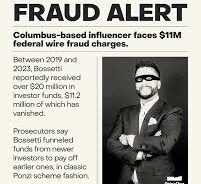If you’ve ever scrolled past a social media ad promising “guaranteed 30% returns” and thought, Wow, that’s either genius or illegal — congratulations, your spidey sense is working. Because in the case of Columbus-based finance influencer Tyler Bossetti, it turns out it was both, until the IRS, the SEC, and a federal grand jury all chimed in with a very firm “nope.”
Bossetti, a self-styled investment guru and co-founder of Boss Lifestyle LLC, just pleaded guilty to wire fraud and tax fraud in connection with a Ponzi scheme that raised more than $23 million from investors between 2019 and 2023. He used social media to build trust, pitch real estate investments, and sell the fantasy of fast money. Spoiler alert: the only real estate he’s likely to get out of this scheme is his future 6×8 federal home.
At the heart of his grift was a classic pitch: short-term real estate deals — buy, renovate, rent or sell — with investor money “secured” by assets and backed by promissory notes. The promised returns? A sizzling 30% or more. And because it’s 2025, he didn’t need a boiler room full of Wolf of Wall Street-style cold callers. He used Facebook, YouTube, Instagram, and a podcast.
But the money didn’t go into properties. It went into Bossetti’s personal lifestyle: a luxury condo in downtown Columbus, a $150,000 Mercedes, luxury travel, and (of course) cryptocurrency.
By the end of the scheme, investors had collectively lost over $11 million.
And just when you thought it couldn’t get more audacious, Bossetti turned to tax fraud. He caused the filing of false 1099-INT forms, reporting bogus interest income for investors. That’s right — he told the IRS that his investors were making money in order to keep the con going.
Let’s be clear: there’s a special circle of tax hell for people who fake IRS forms to cover up theft. That’s not just any fraud. It’s the kind of fraud that gets you years behind bars and your name permanently etched on a government watchlist.
He now faces a maximum residency of 23 years in the aforementioned federal housing. Whatever influencer clout he built has vanished like his marks’ money.
So what can we learn from this very modern cautionary tale?
First, remember the golden rule of investing: if it sounds too good to be true, it probably is. Especially if it’s being sold with a selfie stick. Real investment professionals don’t promise 30% guaranteed returns. And they sure don’t recruit you through a “link in bio.” (Seriously – if they could really make 30%, they wouldn’t need to advertise to mom-and-pop investors.)
Second, don’t underestimate the psychological pull of a confident online persona. Bossetti didn’t just scam people with numbers—he did it with narrative flair. He sold a story of financial freedom, fast wins, and passive income dreams, wrapped in lifestyle branding and faux credibility. It was influencer alchemy with a criminal twist.
And third, pay attention to tax forms. If your 1099s say you made income you never received, that’s not just a clerical error—it’s a siren. If you bring us a 1099 from an “investment” that doesn’t add up, it’s time to ask questions, not file blindly.
Bottom line? Charisma isn’t compliance. A polished Instagram feed doesn’t replace a prospectus. And if you’re investing based on TikTok videos and podcast rants, you may be just one Wire Fraud Wednesday away from losing your life savings.
Let Bossetti’s downfall be a lesson to us all: there’s no such thing as passive income when the IRS gets actively involved.






